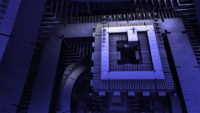University of Chicago Debuts First U.S. Quantum Accelerator
April 12, 2021
The University of Chicago and partners launched the first U.S. program to support quantum-tech startups. University of Chicago physicist and molecular engineer professor David Awschalom, who helped create the Duality accelerator, said, “we are at the birth of a new field of technology … at the point where the transistor is being invented.” Chicago is home to three of the eight federally funded quantum research centers founded in 2020. The University of Toronto has also unveiled a program to support quantum-tech startups.
The Washington Post reports that the accelerator program, based at the University’s Booth School of Business, will invest $20 million over the next 10 years to help “up to 10 quantum startups a year.” Each chosen startup will receive “$50,000 grants, access to lab and office space and close mentoring by science and business faculty members.”

It also reveals that, “the Duality accelerator is hoping to leverage the physics and engineering expertise from its university partners, and from the nearby Argonne and Fermi national labs, to support commercial ideas bubbling up from PhD students and others.” An earlier startup program at the University supported Grubhub and Venmo.
Recent University of Chicago PhD graduate Pranav Gokhale hopes his software startup Super.tech will be a recipient. He built the startup with professor Fred Chong, who noted that, “there is very little on the software side” for quantum computers.
IBM, Google, Honeywell, IonQ, Microsoft and Amazon are among the companies making progress with quantum computing. According Dr. Bob Sutor, VP of AI, blockchain and quantum solutions for IBM Research, the company “has about 20 quantum computers hooked up to the cloud and is offering free access to about half of them so researchers and the general public can experiment.”
Its paying customers include ExxonMobil, Goldman Sachs, Daimler and Boeing, and it just inked a healthcare research partnership with the Cleveland Clinic. Amazon Web Services and Microsoft “also recently began offering cloud access to quantum computers built by IonQ and other companies.”
ZDNet reports that, “IBM has unveiled a quantum developer certification which it says, once devs have passed the 60-question test, will act as proof of at least some of the skills required to build and run quantum programs.”
The certification focuses on Qiskit, IBM’s own quantum computing software development kit, “an open-source platform based on Python scripts that enables developers to carry out a range of quantum experiments, from prototyping quantum algorithms to executing code on cloud-based quantum devices.” Developers will have to prove they “know how to leverage the platform to define and execute quantum circuits, implement single and multi-qubit gates, and write quantum programs.”
IBM global lead for quantum education and open science Abe Asfaw reported that Qiskit has been downloaded 500,000+ times.
“Our certification is a first in the quantum industry,” said Asfaw. “We made it available because we learned throughout our ongoing efforts in workforce development that there are no avenues for standardized quantum computing skills that employers can use in their hiring process. We have also found that developers are interested in showcasing their skills through certifications that are broadly accepted in the industry.”
ZDNet notes that, “the quantum computing industry is expected to become a $65 billion market by 2030.”
Related:
The First-Ever Startup Accelerator for Quantum Tech Just Launched, Futurism, 4/8/21
IBM’s New Tool Lets Developers Add Quantum-Computing Power to Machine Learning, ZDNet, 4/9/21
Making Quantum Computers a Commercial Reality, Harvard Business Review, 4/7/21
Quantum Computers Will Win the Next World War, TheNextWeb, 4/7/21

No Comments Yet
You can be the first to comment!
Sorry, comments for this entry are closed at this time.